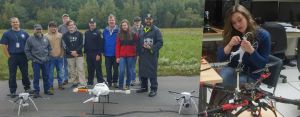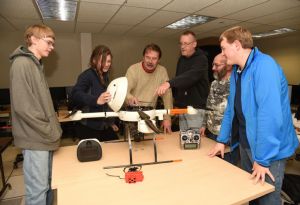

“There’s a lot of cool stuff going on,” is Tim Thomas’s apt summary of the numerous ways that Mohawk Valley Community College’s (MVCC) overlapping ATE grants address the workforce needs emerging with advances in unmanned aircraft systems (UAS), which are also known as drones.
For the college’s $557,487 ATE grant (#1800296) to develop five micro-credentials, Thomas, associate dean for Physical Sciences, Engineering, & Applied Technologies, and Bill Judycki, professor of Remotely Piloted Aircraft Systems (RPAS), followed industry advisors’ guidance to certify short sequences of courses in cybersecurity, GIS, and data analysis, and to strengthen its AAS degree curriculum.
“Micro-credentials are the sweet spot of up-skilling the incumbent workforce,” Thomas said. They’re also a promising vehicle for bringing high school students into the degree program that prepares technicians to pilot, manufacture, program, and repair RPAS as well as analyze the multitude of data the unmanned aircraft gather during flights. A $300,000 Empire State Development Grant the college received in 2015 laid the groundwork for the RPAS degree.
Student Likes Flexibility & Variety within Program
“The flexibility of it is best part of the entire program because there are so many different directions that you can go into with this one degree. You are not just stuck trying to find one single job you can apply for,” said Annie Born, who at 19 years old is midway through the RPAS degree program. She plans to pursue a bachelor’s degree in aeronautical engineering after completing associate degrees in RPAS and engineering science.
She started taking general education courses at MVCC as a sixteen-year-old, dual-enrolled high school student. Since she was a junior in high school she has also worked part time as a machine programmer and operator at Brink Manufacturing in Hamilton, N.Y.
Aside from the multiple career paths that the RPAS degree provides, Born likes it that each day at MVCC involves multiple projects. The RPAS curriculum covers a mix of programming and data analysis along with preparing students to pass the Remote Pilot Certificate exam required by the Federal Aviation Administration (FAA) to operate drones for commercial purposes. “I really like that we’re always moving, we’re always doing something new and different,” Born said.
Being one of two women with 10 men in the program during 2018-2019 was not a problem for her. “It’s a really great environment,” she said, adding that professors have offered helpful advice. “I feel like I would not have gotten this far without them,” she said.
Micro-credentials Fit Employers’ Needs near FAA Test Site
The three micro-credentials that MVCC will offer beginning in fall 2019 are maintenance, data, and operations. Credits from these course sequences will stack toward the college’s RPAS degree. By the end of 2019, micro-credentials in programming and fabrication will also be available as non-credit training until the college obtains approval to offer them for credit.
“In my opinion the big jobs are going to be with the GIS and the data. What do you do with all the information that is pulled from the tool and the drone?” Thomas said. He anticipates that the fabrication credential will eventually overlap with the college’s new work in additive manufacturing.
In May 2019, the college was awarded a $599,943 ATE grant to develop remote lab-sharing models for additive manufacturing skills training (#1902207). To test the efficacy of learning in local and remote labs, students at Finger Lakes Community College and Western Technical College will use remote-access technologies to create prototypes on the equipment at MVCC’s FABLab.
Judycki said MVCC’s RPAS students routinely access the FABLab to “design just about any type of part” for their drones. His voice quickens with excitement as he explains that the RPAS students learn electronics, mechanics, computer science, design skills, CAD, and electronics in response to growing UAS-related businesses in rural, central New York.
His goal is to prepare students for careers at the high-tech start-up companies and research firms that are located in the UAS flight corridor that stretches approximately 50 miles from Syracuse to Rome, NY. MVCC’s Rome campus is adjacent to Griffiss International Airport, one of seven FAA-designated UAS test sites.
“It’s a big hotbed around here,” Judycki said, referring to the activities by Northeast UAS Airspace Integration Research (NUAIR). This coalition of private and public entities focuses on the safe integration of unmanned aircraft into U.S. airspace, and development of detect-and-avoid systems to prevent collisions.
“There’s thousands and thousands of applications, and we have yet to discover many of them,” Judycki said. He points out that “urban mobility” in Dubai already involves low-altitude autonomous aerial vehicles transporting people. He predicts that in the U.S. delivery truck drivers will soon launch drones from vehicles to transport packages the final miles to doorsteps.
“It’s going to be the Jetsons, that’ a fact,” he said.

 Subscribe
Subscribe


 See More ATE Impacts
See More ATE Impacts

Comments
There are no comments yet for this entry. Please Log In to post one.